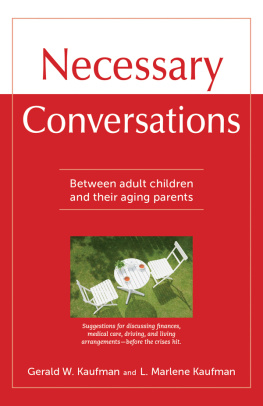
Table of Contents
Guide
Pages
MOM and DAD, We Need to Talk
HOW TO HAVE ESSENTIAL CONVERSATIONS WITH YOUR PARENTS ABOUT THEIR FINANCES
Cameron Huddleston

Copyright 2019 by Cameron Huddleston. All rights reserved.
Published by John Wiley & Sons, Inc., Hoboken, New Jersey.
Published simultaneously in Canada.
No part of this publication may be reproduced, stored in a retrieval system, or transmitted in any form or by any means, electronic, mechanical, photocopying, recording, scanning, or otherwise, except as permitted under Section 107 or 108 of the 1976 United States Copyright Act, without either the prior written permission of the Publisher, or authorization through payment of the appropriate per-copy fee to the Copyright Clearance Center, Inc., 222 Rosewood Drive, Danvers, MA 01923, (978) 7508400, fax (978) 6468600, or on the Web at www.copyright.com. Requests to the Publisher for permission should be addressed to the Permissions Department, John Wiley & Sons, Inc., 111 River Street, Hoboken, NJ 07030, (201) 7486011, fax (201) 7486008, or online at www.wiley.com/go/permissions.
Limit of Liability/Disclaimer of Warranty: While the publisher and author have used their best efforts in preparing this book, they make no representations or warranties with respect to the accuracy or completeness of the contents of this book and specifically disclaim any implied warranties of merchantability or fitness for a particular purpose. No warranty may be created or extended by sales representatives or written sales materials. The advice and strategies contained herein may not be suitable for your situation. You should consult with a professional where appropriate. Neither the publisher nor author shall be liable for any loss of profit or any other commercial damages, including but not limited to special, incidental, consequential, or other damages.
For general information on our other products and services or for technical support, please contact our Customer Care Department within the United States at (800) 7622974, outside the United States at (317) 5723993, or fax (317) 5724002.
Wiley publishes in a variety of print and electronic formats and by print-on-demand. Some material included with standard print versions of this book may not be included in e-books or in print-on-demand. If this book refers to media such as a CD or DVD that is not included in the version you purchased, you may download this material at http://booksupport.wiley.com. For more information about Wiley products, visit www.wiley.com.
Library of Congress Cataloging-in-Publication Data is Available:
ISBN 978-1-119-53836-3 (Hardcover)
ISBN 978-1-119-53843-1 (ePDF)
ISBN 978-1-119-53841-7 (ePub)
COVER DESIGN & ILLUSTRATION: PAUL MCCARTHY
For my mom
INTRODUCTION
Why the Money Talk Is Essential
There's a good chance you recognize the importance of talking to your parents about their finances if you bought this book or are thinking about it. But if you're not entirely convinced that you should discuss how they plan to support themselves in retirement, whether they'll be able to afford long-term care if they need it, or if they have a will, let me share a story that might persuade you.
Once upon a time, I didn't realize how essential it was to have detailed conversations with my mom about her finances. It wasn't that I was afraid to bring up money issues with her. After all, I'm comfortable with the topic because I've been a personal finance journalist for more than 15 years. And my mom didn't treat money as a taboo topic, even though plenty of other people in her generation (including my dad) did.
But as she was approaching retirement, I was busy working, having kids, and getting my own financial house in order. I knew that my mom, for the most part, was on top of her finances. She wasn't a big spender. She owned her house outright and lived comfortably. So I didn't foresee her having any financial woes once she retired or as she aged. That doesn't mean, though, I shouldn't have taken the time out of my busy schedule to chat with her about her plans for her future and what she had in place to ensure a comfortable retirement.
To my credit, I did suggest that my mom look into long-term care insurance right around the time my husband and I moved from Washington, D.C., to my hometown in 2003. She and my father had divorced several years before then, so she didn't have the benefit of a spouse to help care for her if dementia or another condition left her unable to care for herself later in life. A long-term care policy would help ensure that her care would be paid for if she needed it.
So she took my advice and talked to an insurance agent. But no long-term care insurance provider was willing to give her a policy because she was considered too high risk. She had an acoustic neuroma a noncancerous tumor that developed on the nerve from her inner ear to her brain which she had opted to have treated with radiation rather than surgically removed.
When she told me she couldn't get long-term care coverage, I should have used that opportunity to sit down with her and review all of her sources of income to figure out whether she could pay for care on her own if she ever needed it. But I dropped the ball.
As fate would have it, my mom started showing signs that she was having trouble remembering things. Of course, not wanting to think the worst, I initially assumed that she was asking the same questions more than once and repeating things because she had lost her hearing in her left ear as a result of the acoustic neuroma. But one night while I was at her house, it became painfully obvious that her hearing loss wasn't the problem.
She asked me if I wanted to see a new bench she had bought for her patio. We went outside, looked at the bench, then went back in and started talking. Within a few minutes, she asked, Do you want to see the new bench I got for my patio? My heart sank.
At that point, there was no denying that my mom's short-term memory was fading. I should've acted quickly to ask her to make a list of all of her financial accounts, to make sure her legal documents such as her will were updated, and to discuss how to pay for long-term care because it was no longer a question of if she would need it but when.
I should have, but I didn't.
I recognized the need for having a conversation then. But I was afraid not of talking to my mom about her finances but of saying that we needed to have a conversation because she was starting to forget things. I didn't want to be the one to tell her that she was losing her memory.
I ended up calling her primary-care doctor, whom I knew, and asked if he'd be willing to suggest at her next appointment that she be tested for dementia. To my great relief, he did. My mom then met with a neurologist and took a test. But she told me that the neurologist said the results of the test didn't show that she had dementia.
I wasn't convinced. I also knew I couldn't wait any longer to start getting involved in my mom's finances. The first step was getting her to set up an appointment with an attorney to update her legal documents her will, living will, and power of attorney. It was especially important to get those latter two documents drafted. Her living will named my sister and me as her health care surrogates and gave us authority to make health care decisions for her. And we both were named her power of attorney, which gave us the right to make financial decisions for her.
Next page











